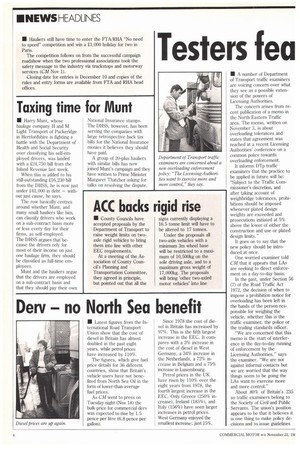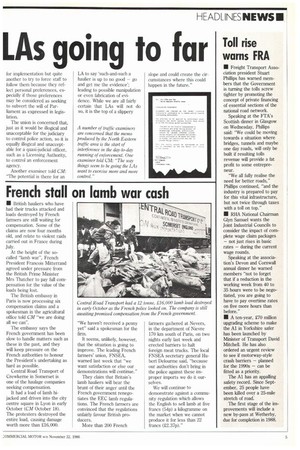Testers fea LAs going to far
Page 6

Page 7

If you've noticed an error in this article please click here to report it so we can fix it.
• A number of Department of Transport traffic examiners are voicing concern over what they see as a possible extension of the powers of Licensing Authorities.
The concern arises from recent publication of a memo in the North Eastern Traffic area, The memo, written on November 3, is about overloading tolerances and states that agreement was reached at a recent Licensing Authorities' conference on a common policy towards overloading enforcement.
It informs DTp traffic examiners that the practice to be applied in future will be: "Subject to the Traffic Commissioner's discretion, and after taking account of weighbridge tolerances, prohibitions should be imposed whenever plated design weights are exceeded and prosecutions initiated at 5% above the lower of either the construction and use or plated design limits."
It goes on to say that the new policy should be introduced at once.
One worried examiner told CM that it appears that LAs are seeking to direct enforcement on a day-to-day basis.
In the past, under Section 56 (7) of the Road Traffic Act 1972, the decision of when to impose a prohibition notice for overloading has been left in the hands of the person responsible for weighing the vehicle, whether this is the traffic examiner, the police or the trading standards officer.
"We are concerned that this memo is the start of interference in the day-to-day running of enforcement by the Licensing Authorities," says the examiner. "We are not against informal contacts but we are worried that the way things seem to be going the LAS want to exercise more and more control."
About 80% of Britain's 235 so traffic examiners belong to the Society of Civil and Public Servants. The union's position appears to be that it believes it is one thing to make policy decisions and to issue guidelines for implementation but quite another to try to force staff to follow them because they reflect personal preferences, especially if those preferences may be considered as seeking to subvert the will of Parliament as expressed in legislation.
The union is concerned that, just as it would be illogical and unacceptable for the judiciary to control police action, so it is equally illogical and unacceptable for a quasi-judicial officer, such as a Licensing Authority, to control an enforcement agency.
Another examiner told CM: "The potential is there for an LA to say 'such-and-such a haulier is up to no good — go and get me the evidence': leading to possible manipulation or even fabrication of evidence. While we are all fairly certain that LAs will not do so, it is the top of a slippery slope and could create the circumstances where this could happen in the future."




















































































